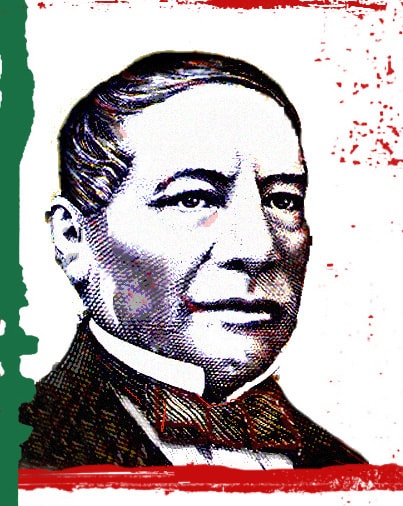Benito Juarez is undoubtedly one of the most important and revered figures in Mexican history. Each March 21st marks the anniversary of his birth and every elementary school in the country commemorates the man who consolidated the nation as a republic.
Of indigenous origin, Benito Pablo Juarez Garcia, was born in 1806 in a village called San Pablo Guelatao, surrounded by the hills of Ixtlan, Oaxaca. His parents, humble Zapotec peasants, died when he was just three years old, so his grandparents cared for him during much of his childhood.
At an early age, Benito realized that in order to succeed, he would need to learn Spanish and then enter school, so he didn’t learn to read and write until he was 12. In 1818, he emigrated by his own means to the city of Oaxaca, in search of fortune. He enrolled in school, but was constantly discriminated against because of his indigenous origin and his little knowledge of the Spanish language.
Thanks to a very strong will and despite not sharing the religious ideas of the time, he decided to attend the city’s seminary to take advantage of the classes offered to people who spoke an indigenous language. He took lessons in Latin, philosophy, and theology, but was convinced, however, that priesthood was not his calling.
After a series of discussions with his chief mentor, Antonio Salanueva, who since his arrival in Oaxaca supported him in all his studies; Juarez left the seminary and decided to study a degree in Law at Oaxaca’s Institute of Science and Arts.
As a law student, he learned French, English and mastered Latin. He was a great student of Civil and Canonical Law and was greatly esteemed by teachers and peers to such an extent that he was appointed rector of the Institute in 1831, professing and openly advocating liberal ideas and defending indigenous communities in the region.
Because of his brilliant career as a student, he was named Alderman of the City of Oaxaca in 1932, Deputy Minister of the State Court and a year later, became a local deputy.
Over the following years, his political career rose steadily, occupying several positions including, Civil Judge, Secretary General of the Government and Attorney General of the Court of Justice among others, until finally, he became acting Governor of the State of Oaxaca in 1847.
During his tenure, he doubled the number of schools in the state, economically balanced state finances, carried out important public works such as local roads and reconstruction of the Government Palace, established schools (for training teachers), drafted geographical maps and drawings of Oaxaca City and founded the port of Huatulco to facilitate transportation of goods from the port of Acapulco.
After political problems with dictator Antonio Lopez de Santa Anna, President of Mexico for the eleventh time, he was locked up in the San Juan de Ulua prison and later exiled to the island of Cuba, then transferred to New Orleans in the United States. There, he met many influential political figures (Ocampo, Mata, Arriaga and Montenegro) who had also suffered Santa Anna’s persecution and were deported, and with whom he planned to return to Mexico and win public power.
Thanks to the triumph of the Ayutla Revolution in which Juarez actively participated, he managed to overthrow dictator Santa Anna and returned to Mexico to continue his political career. In 1858, he was appointed President, becoming the first president of indigenous origin in a country ridden with inequalities and internal power struggles. The “Benefactor of the Fatherland and the Americas” as stated at the time of his death, passed several laws that removed the inordinate privileges enjoyed by the clergy and the military; both of whom ignored Juarez’s government and tried to have them revoked. For this reason, he was forced to move his government from state to states, in a sort of itinerant presidency, to avoid capture.
In 1861, due to the precarious situation of the country and its high international debt, Juarez announced a moratory of payments. Spain, France and the United Kingdom, the main countries to whom Mexico had debt with, decided to invade the Mexican territory and defend their interests. After several negotiations, Juarez finally repealed the Suspension of Payments and the Spanish and English armies returned home. But the French, who were interested in establishing a monarchy, continued their invasion. Gallic troops entered Veracruz with relative ease but were met by Juarez’s troops in Puebla in the famous ‘5 de Mayo’ Battle, in which what was considered the most powerful army in the world was defeated.
These impressive achievements gave Juarez worldwide popularity. However, conservatives along with the Church –always at odds with liberal reforms – offered the crown of the Second Mexican Empire to the Austrian, Maximilian of Hapsburg in 1863, thus starting another episode of power disputes. After several battles in northern and central Mexico, Juarez finally defeated Maximilian and ordered him to be executed by firing squad, thus definitely ending the attempt to establish an empire sponsored mainly by France and the Vatican.
The changes that Juarez brought about in Mexico during his presidency were central to promoting equality and disempowering the church, which for many years had dominated the economy, education and social life of Mexico. Las Leyes de Reforma, the reforms enacted during the Juarez’s government effectively removed the inherent immunity of the clergy and the military; they declared that all people are equal before the law; they banned the church from collecting parochial obligations from their faithful, such as tithing (diezmo or 10% of their wages); property owned by churches was passed to the State, freedom of worship was declared, the existence of cloisters and monasteries was banned and the registration of births, marriages and deaths also passed to the State (civil registration).
Benito Juarez died in Mexico City on July 18, 1872, due to angina pectoris, leaving a legacy that survives to this day.
Francisco Abiut Fragoso


